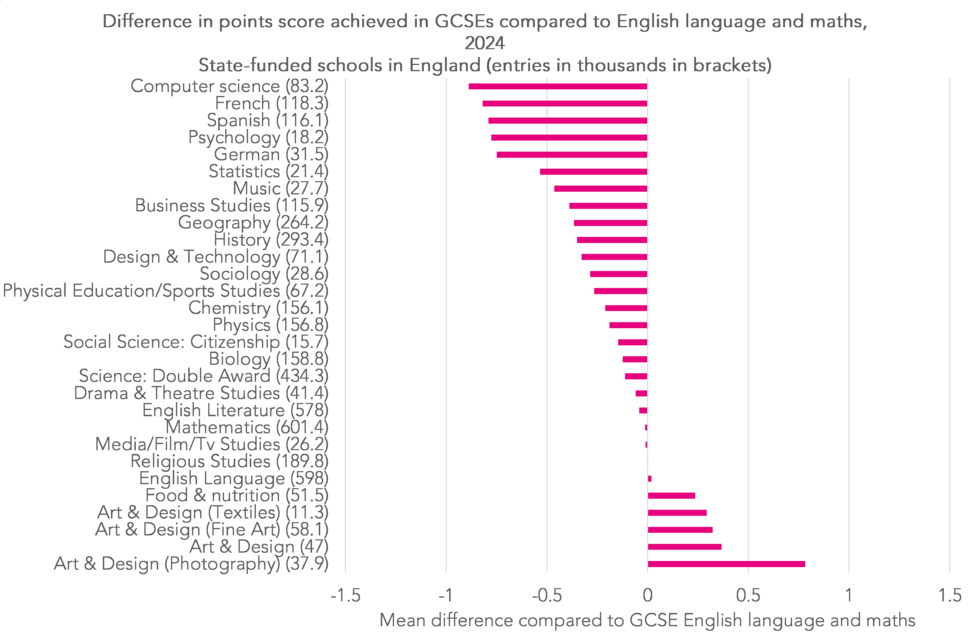A prominent think tank is calling for modern foreign language and computer science GCSEs to be graded more generously, as analysis suggests they are consistently graded more severely than other subjects.
FFT Education Datalab analysis of 2024’s GCSE results calculated average scores for every pupil in English and maths, and using this as a baseline, compared it to their grades in other subjects.
Computer science appeared most “harshly” graded, according to this analysis. Computer science pupils tended to receive a grade that was almost an entire grade lower than their average grade for English language and maths.
It was followed by French and Spanish, psychology, German, and statistics.
Grades in these subjects were more than half a grade lower than pupils’ grades in English and maths.
At the other end of the spectrum, pupils entering GCSE photography tended to achieve half a grade or more than in English and maths, the study found.

“Action to address historic low grading in MFL (modern foreign languages) is long overdue,” said Dave Thomson, chief statistician at FFT, and author of the report.
“At the very least, pupils’ grades could be brought in line with those that they achieve in geography and history.”
In 2023, when Datalab last ran similar analysis, German topped the table, followed by French, computer science then Spanish.
Efforts have since been made “to bring French and German grades in line with Spanish, says Datalab.
German now appears slightly less severely graded than Spanish. But Datalab said even Spanish is “still graded too severely”.
Greater grade adjustments needed
Reformed GCSEs in MFL were rolled out last September, designed to make the qualifications “more accessible”. The first set of results will be reported in 2026.
“If ever there were a time to adjust grading standards it would be then although there does not appear to be any suggestion that this will happen,” said Thomson.
Last summer Ofqual reported grading in computer science gradually became more severe between 2014 and 2019, and it recommended a grading adjustment to help balance this.
But Thomson said: “It does not look like the adjustments go far enough”.
Language ‘penalty’ bigger for boys
The “MFL penalty” appears greater for boys than girls, the Datalab study found.
Boys’ grades in French and Spanish are on average a whole grade lower than their average for English language and maths.
In other subjects, the gender divide is much more mixed.
Girls’ grades in a range of subjects – including drama, English, and media studies – are generally higher than their English and maths average, while for boys they are lower.
Girls tend to get similar grades in design and technology to their English and maths average, while boys’ DT grades tend to be almost half a grade lower. The gender divide is almost reversed in physics.
There was a correlation between attainment in English and maths and attainment in other subjects.
Those entering the most severely graded subjects – French, German, Spanish and computer science – tended to get higher grades in English and maths.
Meanwhile English and maths attainment tended to be lower among the less severely-graded subjects, including BTEC health and social care and GCSE photography.
Ofqual said it “will continue to review” standards across GCSEs.
“It is important that standards are maintained in qualifications, so that they signal accurately what students know, understand and can do,” said a spokesperson.
“Last year Ofqual required exam boards to make small grading adjustments to award more generously in three GCSE subjects – in French and German to align standards with GCSE Spanish, and in computer science to align standards over time. We required exam boards to make these changes after extensive research.
“We will continue to review standards and take action where required.”







Your thoughts